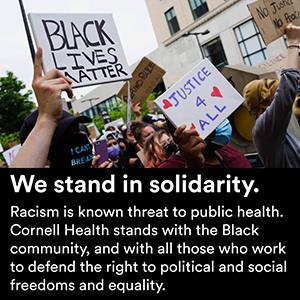Recent events have once again brought into sharp relief the depth of systemic racism in the U.S., with several high-profile killings of Black Americans at the hands of police officers and the resulting national and international protests. Amid the outrage and pain related to these acts of overt racism and violence, a growing number of local and state government leaders as well as health organizations around the nation are affirming racism as a serious public health crisis. Cornell Health joins those standing with the Black community as well as those advocating for individual civil rights and actively addressing the deep systemic issues that have contributed to the present moment.
Positioning the longstanding issue of racism as a public health crisis is not just a matter of semantics. Framing racism as a public health issue compels organizations and governmental units across the country to address the crisis in the broad, systemic ways that other threats to public health have been addressed over time. These can include strategic initiatives in policies, practices, enforcement, education, and support services.
Health inequities & social determinants of health
It is abundantly clear that racism is lethal to Black Americans as well as indigenous people and other people of Color. It kills in obvious ways (e.g., acts of individual and police violence against BIPOC) and also by fueling more subtle socioeconomic conditions (e.g., inequitable access to education, housing, employment; bias in the judicial and criminal justice system) that, in turn, contribute to serious health issues such as increased risk of diabetes, stress, maternal mortality, hypertension, asthma, mental health conditions, and heart disease. These factors, along with other realities into which many BIPOC people are born and live, work, and play (i.e., the social determinants of health) are key drivers of unfair and unavoidable health inequities that, too often, result in illness and premature death.
Racism does not exist in a vacuum. Federal and state policies and practices have been created over time to perpetuate and systematize discrimination based on race and have limited access to power for BIPOC people to change these systems under which they must live. As a result, racial discrimination affects access to safe and affordable housing, healthcare, education, and employment—essentially every dimension of living as a BIPOC—while also dis-empowering members of these communities from having a voice or sense of agency in their lives.
The impact of racism (implicit, explicit, and systemic) on the lives of BIPOC was amplified during the COVID-19 pandemic when communities of color faced not only disproportionate numbers of underlying health conditions, but also inequitable access to health insurance, testing, treatment, and care. Such long-standing systemic health and social inequities have resulted in racial and ethnic minority groups—largely BIPOC—being at increased risk of contracting COVID-19 and/or experiencing more severe illness as a result, regardless of age.
Given that every person holds multiple identities (e.g., race, gender, sexuality, ability, age, education, SES), public health interventions designed to address racism will only be successful if they are mindful of the unique and varied lived experiences of individuals with multiple and intersecting identities.
Campus framework
At Cornell, a public health model has been useful in guiding campus approaches to promote health and foster well-being for the campus community. It has been applied directly to issues including mental health, alcohol and other drug use, hazing, sexual violence, and, increasingly toward both bias prevention and antiracism.
Public health practitioners in Cornell Health influence the work of many areas within our organization, and help inform approaches to prevention as well as intervention and treatment. Our staff recognize and embrace the social justice imperatives inherent in the work we do, and we remain steadfast in our commitment to dismantle beliefs, policies, and practices of discrimination and oppression inherent in the U.S. health care system.
Cornell Health’s service delivery model is designed to provide equitable access to students, regardless of insurance and to provide services and support for the diverse student population. Please read more about our commitment to diversity and inclusion and our efforts to reduce barriers to care in order to create equitable access to health services.
Sources
- American Public Health Association:
Racism is An Ongoing Public Health Crisis That Needs Our Attention Now - American Academy of Family Physicians (AAFP):
“The Public Health Crisis of Racism” Town Hall webinar, Monday June 22, 2020 - Harvard School of Public Health:
Racism is a Public Health Crisis - Health Equity Guide:
Why Lead with Race - Institute for Healthcare Improvement (IHI):
IHI Speaks Out on Recent Racial Injustices
The Role of Racism as a Core Patient Safety Issue - Public Health Insider:
Racism is a Public Health Crisis: The Transformation Starts Here. It Starts with Us. - Stanford Social Innovation Review (SSIR):
Advancing Equity in Health Systems by Addressing Racial Justice - University of Michigan School of Public Health (U-M SPH):
Healing in Public Health: Oppression, Trauma, and Resilience
Racism’s Toll on Health


